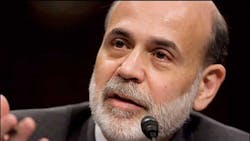Fed Aims To Stimulate Job Growth with New QE3 Program
The U.S. Federal Reserve took aim at slow growth and high joblessness Thursday, announcing a new $40 billion per month bond-buying program as it slashed its 2012 growth forecast.
The Fed signaled that monetary easing efforts would remain in place until it sees substantial improvement in the U.S. jobs market, where 8.1% of Americans remain unemployed.
Pointing to weak growth and stagnation in hiring, the Fed said it would spend $40 billion on agency mortgage-backed securities each month in an open-ended operation, its third "quantitative easing" program in less than three years.
Monthly Purchases Rise to $85 Billion
"QE3" would take the U.S. central bank's total monthly purchases, including ongoing programs, to $85 billion a month, the Fed said.
That "should increase the downward pressure on long-term interest rates more generally, but also on mortgage rates specifically, which should provide further support for the housing sector, encouraging home purchases and refinancing," said Fed Chairman Ben Bernanke.
The effect should spill through to the broader economy, pushing up the prices of homes, stocks, and other assets that, the Fed hopes, will make Americans feel more comfortable and begin spending
If people feel that their financial situation is improved because the value of their house, or their stocks-invested retirement fund has gained value, "they're more willing to spend," Bernanke explained.
"That's going to provide the demand most firms need to be able to hire or invest."
Benchmark Interest Rate to Remain Near Zero
The Federal Open Market Committee, the Fed's policy board, also pledged to hold its benchmark interest rate at near-zero through mid-2015, at least six months longer than its earlier commitment.
And the FOMC said its monetary stimulus efforts will remain in place "for a considerable time after the economic recovery strengthens," a promise it had not made before.
"If the outlook for the labor market does not improve substantially, the Committee will continue its purchases of agency mortgage-backed securities, undertake additional asset purchases, and employ its other policy tools as appropriate until such improvement is achieved."
"We're just trying to get the economy moving in the right direction to make sure that we don't stagnate at high levels unemployment," Bernanke told reporters after the FOMC issued its new policy statement.
A ‘Grave Concern’
The unemployment situation remained a "grave concern," he said, adding: "The weak job market should concern every American."
The FOMC cut its forecast for growth this year to 1.7% to 2% from the previous 1.9% to 2.4% range, though it predicted a pickup to 2.5% to 3% in 2013.
The jobless rate would still be in the 6.7% to 7.3% range at the end of 2014, while inflation, would remain at or below the Fed's 2% target through 2015.
After months of debating whether to embark on new stimulus, all but one of the 12-member FOMC fell in line with Bernanke's worries that little ground was being made on the high jobless rate.
"As we look at the last six months, we've seen unemployment basically the same place it was in January. We've seen not enough jobs growth to bring down the unemployment rate, and what we need to see is more progress," Bernanke said.
"There is not a specific number we have in mind. But what we've seen last six months isn't it," he said.
Analysts Expect Little Impact
UniCredit's Harm Bandholz said that despite their optimism for growth next year, Fed officials "preferred to act now in order to buy insurance against further downturns."
But he and others said that the impact was not likely to be significant, given external risks to the economy from Europe and China and the political stalemate over fiscal policy.
"Today's monetary policy decision is unlikely to have any perceptible impact on the labor market and the U.S. economy in general," he said, as long as businesses are worried about the fiscal stalemate.
"Bernanke is marching U.S. monetary policy even further into totally uncharted territory," said John Ryding and Conrad DeQuadros and RDQ Economics.
"Our view is that these actions will do little to stimulate growth but will raise inflation expectations," they said.
U.S. stock markets jumped at the news. At the close the S&P 500 was up 1.63%, and the Dow 1.55%.
The dollar fell, trading at one euro to $1.2988 after going past the $1.30 line momentarily.
Copyright Agence France-Presse, 2012
About the Author
Agence France-Presse
Copyright Agence France-Presse, 2002-2025. AFP text, photos, graphics and logos shall not be reproduced, published, broadcast, rewritten for broadcast or publication or redistributed directly or indirectly in any medium. AFP shall not be held liable for any delays, inaccuracies, errors or omissions in any AFP content, or for any actions taken in consequence.
